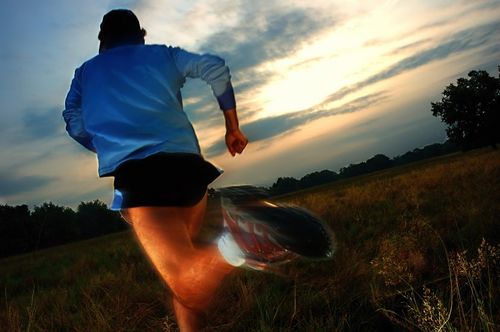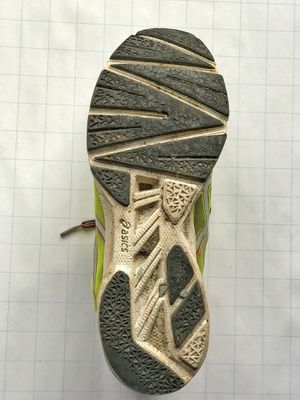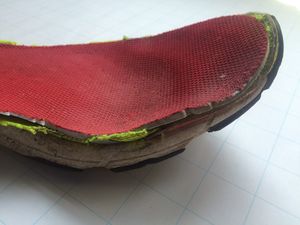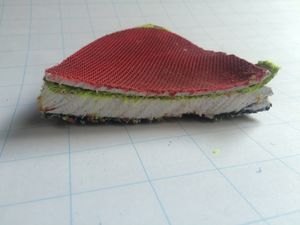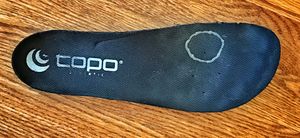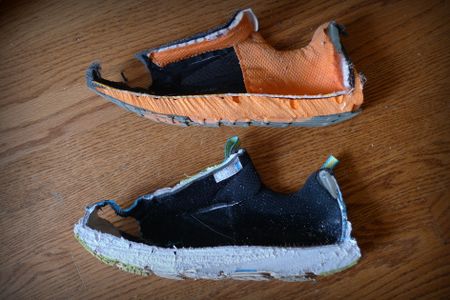Difference between revisions of "Shoes"
User:Mediawiki (User talk:Mediawiki | contribs) m (1 revision) |
User:Fellrnr (User talk:Fellrnr | contribs) |
||
| (62 intermediate revisions by the same user not shown) | |||
| Line 1: | Line 1: | ||
| + | [[File:Runnering Shoes 1449592 m.jpg|right|thumb|500px]]{{DISPLAYTITLE:Best Running Shoes}} | ||
| + | These reviews cover what I consider to be the best running shoes as well as some strong contenders and a few promising shoes that missed the mark. Based on [[The Science of Running Shoes]], I believe that [[What to Look for in Running Shoes]] is a shoe that does not interfere with the way you run, though I include some shoes that can be useful in transitioning from a more traditional shoe. '''These reviews are not being maintained'''. | ||
| + | =The Best Running Shoe= | ||
| + | {{:Shoes-best}} | ||
| + | =Shoe Categories= | ||
| + | I've classified my shoe recommendations into several categories, each with their own pros and cons. | ||
| + | * '''[[Maximalist]]''' (Minimum Drop, Maximum Cushioning). The minimal drop has been the hallmark of minimalist shoes, but these shoes also include lots of cushioning. At their best, these shoes can be like running barefoot on a cushioned track. Maximalist shoes offer lots of protection and comfort. They are great for longer ultramarathons where sore feet become a problem and for trail running where the cushioning makes it easier to ignore smaller rocks and stones. However, the extra cushioning may [[The Science of Running Shoes| increase the risk of injury]] compared with minimalist shoes and the extra sole thickness increases the stress on your ankle. | ||
| + | * '''Optimal'''. These shoes ideally have just enough cushioning to improve [[Running Economy]] without the weight penalty of the Maximalist shoes. These shoes are often called "racing shoes", or "racing flats", but I don't believe this term is appropriate any more. Many years go, a "racing flat" had little cushioning, but with the advances in materials science, these shoes are now surprisingly comfortable. | ||
| + | * '''Fast'''. These are the fastest shoes, often compromised in other ways to achieve their performance. | ||
| + | * '''Minimalist'''. These shoes vary between the almost barefoot and those with a little more protection. I consider a shoe to be minimalist if it has insufficient cushioning to improve [[Running Economy]]. | ||
| + | * '''Balanced'''. These are shoes that are part way between minimalist and Maximalist, but are too heavy to be considered Optimal. | ||
| + | * '''Traditional'''. The classic running shoe has a high heel, normally about 10mm higher than the forefoot . The biggest advantage of traditional shoes is the wide variety to choose from, making it far easier to find the right fit. | ||
| + | =Unfamiliar Brands= | ||
| + | You're probably familiar with brands like Nike, Adidas, New Balance, etc., but you may be less familiar with Hoka and Altra. | ||
| + | * '''[[Hoka Shoe Review| Hoka One One]].''' The Hoka shoes started the 'Minimum Drop, Maximum Cushioning' style of shoe. The Hokas generally use extremely soft foam, with a wide base to improve stability. Their soles are thicker than most shoes so they are quite heavy, though not as heavy as they look. Most of the Hokas do well on both asphalt and rocky trails. The Hokas provide remarkable protection from rough trail surfaces, and the thick, soft soles mold themselves around stones to provide more grip on rocky trails than you'd expect. Other than the sole, the Hoka is a poor design, with a remarkably tight toe box and they are typically rather inflexible. | ||
| + | * '''Altra'''. The two distinctive features of the Altra shoes are their zero drop and their shape which mirrors the shape of the human foot. Originally their shoes were quite minimalist with a thinner sole that was typically made of quite firm foam. More recently they have moved towards softer cushioning and the [[Maximalist]] style. | ||
| + | * '''Topo'''. Like Altra, Topo make shoes that are designed for the human foot. I find that the shape of Topo shoes is even better than Altra, with more room for my toes to move naturally. | ||
| + | =How Long Will They Last?= | ||
| + | There are a lot of variables in how long a running shoe will last, involving both the runner and the shoe. You'll need to understand your running style to understand how long a shoe is likely to last for you. | ||
| + | * A runner that lands harder will wear out their shoes more quickly. | ||
| + | * If the landing forces are concentrated, this will dramatically increase shoe wear. So a runner than lands with a midfoot strike will tend to spread the landing forces, where a runner that lands on the edge of the heel will focus the forces in a small area. | ||
| + | * Good [[Running Form]] ensures that the shoe doesn't scrape as it lands. Without this 'paw back', the scraping will wear away the rubber or foam quickly. If the scraping is combined with a concentrated landing area, the effect is a rapid removal of material under the initial contact patch. | ||
| + | * For most shoes, the limiting factor in shoe life is the foam cushioning rather than the harder rubber outsole. The means the foam becomes compressed and offers less cushioning. The reduced cushioning is generally not the problem, but rather it's the uneven reduction across the shoe that starts to cause biomechanical problems. A common situation is that the foam under the ball of the foot wears and so the foot is tilted inward. The foam insole often fails faster than the midsole, so consider [[Replacement Insoles]] to extend the shoe life. | ||
| + | * Thinner shoes tend to last longer than thicker shoes, which is perhaps counterintuitive. This is because a shoe with a 40mm midsole that loses 20% of its thickness due to wear would be 8mm thinner, where a shoe with only 10mm would only lose 2mm. | ||
| + | * The life of the hard rubber outsole is rarely an issue, and by the time the outsole is worn through the foam is dead. However, there are shoes that use relatively soft outsole that can wear more quickly. If you're wearing through the outsole before the foam is dead, there's a good chance you're not pawing back correctly and your shoes are scraping as they land. This tends to waste energy and is a sign of poor [[Running Form]]. | ||
| + | * Shoes that don't have a hard rubber outsole can suffer from abrasion wearing away the foam. With these shoes the scraping due to lack of paw back has a much bigger impact on shoe life as the foam is much less resistant to being scraped. | ||
| + | * Temperature can play a factor in shoe life. Hot temperatures can soften shoes and cause them to wear quickly. At Badwater I've had shoes wear away more in 30 miles than I would normally see in 300. On the other hand, foam gives far less cushioning in cold weather, so a shoe that might be okay in the summer might feel worn out in winter. | ||
| + | * The running surface changes the rate of abrasion if that's the limiting factor. Rough concrete or asphalt will erode the shoe more quickly than a smooth surface or dirt. | ||
| + | * How much wear is too much also depends on the individual runner. Some runners may tolerate very little wear, but I know runners that can continue to run injury free in shoes that most people would consider destroyed. | ||
| + | {| class="wikitable" | ||
| + | |- valign="top" | ||
| + | |[[File:WornHS6Shoes.jpg|none|thumb|300px|This is a picture of a friend's [[Asics Gel Hyper Speed 6]] showing dramatic outsole wear. These shoes had only completed 230 miles but you can see the outsole is completely gone in places. I suspect that the runner in question is scraping slightly on landing rather than pawing back fully.]] | ||
| + | |[[File: ComparisonHS6Shoes.jpg|none|thumb|300px|By comparison this is my Hyper Speed 6 shoes that have far more miles on them. You can see that most of the outsole still has its texture, and the only real outsole wear is on the extreme heel.]] | ||
| + | |} | ||
| + | ==My Experiences with Shoe Life== | ||
| + | Since I started tracking my shoe life more accurately with [[MilestonePod]]s, I've found that there is far more wear on my shoes than I realized. With my [[Foot Strike]] the cushioning degrades so that the sole under the ball of my foot is quite a bit lower than the rest of the forefoot. I calculate that about 2mm of compression under the ball of the foot is like running on the camber of a standard road (~3°), which creates additional stresses and might be a cause of injury. In as little as 100 miles (160Km) I've had shoes compress by 4mm under the ball of my foot! Since I injured my meniscus I've found I can't tolerate shoes with that much wear, as this artificial camber irritates my knee. Prior to my knee injury I could get away with quite massively worn shoes, sometimes putting on as much as 3,000 miles (5,000 Km) before retiring them. | ||
| + | {| class="wikitable" | ||
| + | |- valign="top" | ||
| + | |[[File:ShoeWear1.JPG|none|thumb|300px|This picture shoes the compression of the midsole that occurs under the ball of the foot.]] | ||
| + | |- valign="top" | ||
| + | |[[File:ShoeWear2.JPG|none|thumb|300px|Here's a cross section through the same shoe, showing how much thinner the foam has become due to wear. (This is from a left shoe, so the ball of the foot is on the right of the slice.)]] | ||
| + | |- valign="top" | ||
| + | |[[File:Insole Wear and Foot Strike.jpg|none|thumb|300px|An insole where I've marked the area of compression, which is under the ball of my foot.]] | ||
| + | |} | ||
| + | =How Far Can I Run In That Shoe?= | ||
| + | Many shoe reviews talk about "this shoe is good up to half marathon", or some other distance. Such advice is based on the idea that many people find that as the distance increases, they want a little more cushioning to protect their feet from the pounding and to offset a little of the fatigue that sets in over time. However, because different runners want radically different levels of cushioning, generalized advice is unhelpful at best. Some runners may want a [[Maximalist]] shoe when they run a 5K, while others will run a 100-mile race barefoot. There is no maximum distance that can be run in any given shoe; it depends on what you want. I compare cushioning levels provided by the shoes I review, but remember a thicker, firmer shoe would have the same cushioning rating as a thinner, softer shoe, but would feel rather different. | ||
| + | =Comparison Table= | ||
| + | {{:Shoes-table}} | ||
| + | =Shoe Modifications= | ||
| + | ''Main article: [[Shoe Modifications]]'' | ||
| − | + | [[File:ModifiedShoes.JPG|none|thumb|250px|Clockwise from the top: Nike Free 3.0 (early version) cut open more than most to form a 'running sandal', Saucony Hattori, NB Trail Minimus, Nike Free 3.0 and the [[Hoka Shoe Review|Hoka]].]] | |
| − | + | With a few exceptions such as the Mizuno Curoris, I find that most shoes benefit from [[Shoe Modifications| cutting open the toe box]]. This allows the toes to spread out as you toe off, creating more natural biomechanics and preventing toe blisters. | |
| − | + | =Shoes for Heavier Runners= | |
| − | + | As a broad generalization, foot length is generally proportional to height, body weight is proportional to the square of your height, and foot area is proportional to the square of your foot length. This means that for a given BMI, the perceived cushioning should be about the same regardless of absolute weight, and you'll need more cushioning if your BMI is higher, and less cushioning if your BMI is lower. You may also need more cushioning if your feet are disproportionately small and less if your feet are disproportionately large. Of course, different runners prefer radically different levels of cushioning, with some liking an un-cushioned minimalist shoe and others a massively cushioned Maximalist shoe. But if you'd like to scale my reviews, I'm 5' 10"/180cm, I weigh about 140 pounds/64 Kg, which is a BMI of about 20, and take about a men's US 10.5/UK 10/EU 45 shoe size. | |
| − | + | =Shoe Gallery= | |
| − | + | Images of the shoes reviewed on this site can be found in the [[Shoe Gallery]]. | |
| − | + | =Shoe Dissection = | |
| − | + | ''Main article: [[Shoe Dissection]]'' | |
| − | + | ||
| − | + | [[File:HokaOlympusSlice.JPG|none|thumb|x300px|A comparison between the Altra Olympus and Hokas.]] | |
| − | + | Ever wonder what the inside of your shoe looks like? Take a look inside; I've cut many of my shoes in half to reveal their construction, as you can see above. You can see a gallery at [[Shoe Dissection]], as well as in the detailed shoe reviews. | |
| − | + | =Frankenshoes= | |
| − | [ | + | ''Main article: [[Frankenshoes]]'' |
| − | [ | ||
| − | |||
| − | |||
| − | |||
| − | |||
| − | |||
| − | |||
| − | |||
| − | |||
| − | |||
| − | |||
| − | |||
| − | |||
| − | |||
| − | |||
| − | |||
| − | |||
| − | |||
| − | |||
| − | |||
| − | |||
| − | |||
| − | |||
| − | |||
| − | |||
| − | = | ||
| − | |||
| − | |||
| − | |||
| − | |||
| − | |||
| − | [ | ||
| − | |||
Revision as of 10:02, 11 January 2024
These reviews cover what I consider to be the best running shoes as well as some strong contenders and a few promising shoes that missed the mark. Based on The Science of Running Shoes, I believe that What to Look for in Running Shoes is a shoe that does not interfere with the way you run, though I include some shoes that can be useful in transitioning from a more traditional shoe. These reviews are not being maintained.
Contents
1 The Best Running Shoe
If you're looking for "the best of the best" running shoe, here are my top picks. Of course, the answer will depend a little on what you're looking for, so I have recommendations for various categories.
- Best All Round Shoe. The Altra Escalante is my current all-round favorite. It has plenty of cushioning for its weight, it has a very springy midsole, it lasts well, and it has a shape that's closer to the shape of a human foot than most shoes. It's a great shoe for any runner, including those Starting to run. It's also a fairly easy shoe to find due to its popularity.
- Best Maximalist Shoe: If you want something massively cushioned, then I'd recommend the Saucony Kinvara 8. It's remarkably light and remarkably cushioned, beating Hoka at their own game.
- Best Optimal Shoe: For those looking to trade cushioning for speed, the Nike Zoom Streak LT 3 was my top pick, but the latest version (LT 4) falls short of it's predecessor. There are lots of great optimal running shoes, which provide just enough cushioning with light weight and minimal frills, but all have their weak spots. Probably the best option at the moment is the Altra Vanish-R, which offers great cushioning for just over 5oz/150g.
- Fastest Shoe: If you really want speed, then check out the Nike Vaporfly 4%. It's light, massively cushioned, and has a carbon fiber plate. Nothing comes close, not even the now defunct New Balance RC5000 or New Balance RC5000v2. There are a number of caveats; it's really expensive, it's really hard to find, and there's a significant injury risk.
- Best Minimalist Shoe: Merrell Trail Glove. I recommend the trail glove for road running in spite of the 'trail' moniker. It's not a fast shoe by any means, but it's comfortable and will last well.
- All Terrain Shoe. For trail running, I've become a fan of Altra, and I think their best shoe is the the Altra Timp, though the Altra Lone Peak is really close.
- Honorable Mention: It's not really a running shoe, but the Vivobarefoot Ra is comfortable, minimalist and can more or less pass as a dress shoe. I've worn mine to weddings with a suit and they've not looked out of place. You can run in the Ra, but the leather means it doesn't breathe well.
2 Shoe Categories
I've classified my shoe recommendations into several categories, each with their own pros and cons.
- Maximalist (Minimum Drop, Maximum Cushioning). The minimal drop has been the hallmark of minimalist shoes, but these shoes also include lots of cushioning. At their best, these shoes can be like running barefoot on a cushioned track. Maximalist shoes offer lots of protection and comfort. They are great for longer ultramarathons where sore feet become a problem and for trail running where the cushioning makes it easier to ignore smaller rocks and stones. However, the extra cushioning may increase the risk of injury compared with minimalist shoes and the extra sole thickness increases the stress on your ankle.
- Optimal. These shoes ideally have just enough cushioning to improve Running Economy without the weight penalty of the Maximalist shoes. These shoes are often called "racing shoes", or "racing flats", but I don't believe this term is appropriate any more. Many years go, a "racing flat" had little cushioning, but with the advances in materials science, these shoes are now surprisingly comfortable.
- Fast. These are the fastest shoes, often compromised in other ways to achieve their performance.
- Minimalist. These shoes vary between the almost barefoot and those with a little more protection. I consider a shoe to be minimalist if it has insufficient cushioning to improve Running Economy.
- Balanced. These are shoes that are part way between minimalist and Maximalist, but are too heavy to be considered Optimal.
- Traditional. The classic running shoe has a high heel, normally about 10mm higher than the forefoot . The biggest advantage of traditional shoes is the wide variety to choose from, making it far easier to find the right fit.
3 Unfamiliar Brands
You're probably familiar with brands like Nike, Adidas, New Balance, etc., but you may be less familiar with Hoka and Altra.
- Hoka One One. The Hoka shoes started the 'Minimum Drop, Maximum Cushioning' style of shoe. The Hokas generally use extremely soft foam, with a wide base to improve stability. Their soles are thicker than most shoes so they are quite heavy, though not as heavy as they look. Most of the Hokas do well on both asphalt and rocky trails. The Hokas provide remarkable protection from rough trail surfaces, and the thick, soft soles mold themselves around stones to provide more grip on rocky trails than you'd expect. Other than the sole, the Hoka is a poor design, with a remarkably tight toe box and they are typically rather inflexible.
- Altra. The two distinctive features of the Altra shoes are their zero drop and their shape which mirrors the shape of the human foot. Originally their shoes were quite minimalist with a thinner sole that was typically made of quite firm foam. More recently they have moved towards softer cushioning and the Maximalist style.
- Topo. Like Altra, Topo make shoes that are designed for the human foot. I find that the shape of Topo shoes is even better than Altra, with more room for my toes to move naturally.
4 How Long Will They Last?
There are a lot of variables in how long a running shoe will last, involving both the runner and the shoe. You'll need to understand your running style to understand how long a shoe is likely to last for you.
- A runner that lands harder will wear out their shoes more quickly.
- If the landing forces are concentrated, this will dramatically increase shoe wear. So a runner than lands with a midfoot strike will tend to spread the landing forces, where a runner that lands on the edge of the heel will focus the forces in a small area.
- Good Running Form ensures that the shoe doesn't scrape as it lands. Without this 'paw back', the scraping will wear away the rubber or foam quickly. If the scraping is combined with a concentrated landing area, the effect is a rapid removal of material under the initial contact patch.
- For most shoes, the limiting factor in shoe life is the foam cushioning rather than the harder rubber outsole. The means the foam becomes compressed and offers less cushioning. The reduced cushioning is generally not the problem, but rather it's the uneven reduction across the shoe that starts to cause biomechanical problems. A common situation is that the foam under the ball of the foot wears and so the foot is tilted inward. The foam insole often fails faster than the midsole, so consider Replacement Insoles to extend the shoe life.
- Thinner shoes tend to last longer than thicker shoes, which is perhaps counterintuitive. This is because a shoe with a 40mm midsole that loses 20% of its thickness due to wear would be 8mm thinner, where a shoe with only 10mm would only lose 2mm.
- The life of the hard rubber outsole is rarely an issue, and by the time the outsole is worn through the foam is dead. However, there are shoes that use relatively soft outsole that can wear more quickly. If you're wearing through the outsole before the foam is dead, there's a good chance you're not pawing back correctly and your shoes are scraping as they land. This tends to waste energy and is a sign of poor Running Form.
- Shoes that don't have a hard rubber outsole can suffer from abrasion wearing away the foam. With these shoes the scraping due to lack of paw back has a much bigger impact on shoe life as the foam is much less resistant to being scraped.
- Temperature can play a factor in shoe life. Hot temperatures can soften shoes and cause them to wear quickly. At Badwater I've had shoes wear away more in 30 miles than I would normally see in 300. On the other hand, foam gives far less cushioning in cold weather, so a shoe that might be okay in the summer might feel worn out in winter.
- The running surface changes the rate of abrasion if that's the limiting factor. Rough concrete or asphalt will erode the shoe more quickly than a smooth surface or dirt.
- How much wear is too much also depends on the individual runner. Some runners may tolerate very little wear, but I know runners that can continue to run injury free in shoes that most people would consider destroyed.
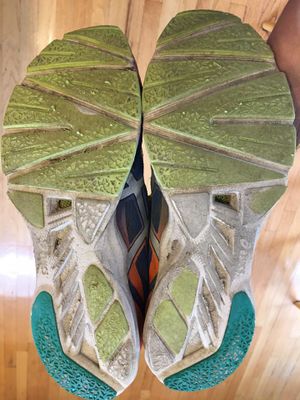 This is a picture of a friend's Asics Gel Hyper Speed 6 showing dramatic outsole wear. These shoes had only completed 230 miles but you can see the outsole is completely gone in places. I suspect that the runner in question is scraping slightly on landing rather than pawing back fully. |
4.1 My Experiences with Shoe Life
Since I started tracking my shoe life more accurately with MilestonePods, I've found that there is far more wear on my shoes than I realized. With my Foot Strike the cushioning degrades so that the sole under the ball of my foot is quite a bit lower than the rest of the forefoot. I calculate that about 2mm of compression under the ball of the foot is like running on the camber of a standard road (~3°), which creates additional stresses and might be a cause of injury. In as little as 100 miles (160Km) I've had shoes compress by 4mm under the ball of my foot! Since I injured my meniscus I've found I can't tolerate shoes with that much wear, as this artificial camber irritates my knee. Prior to my knee injury I could get away with quite massively worn shoes, sometimes putting on as much as 3,000 miles (5,000 Km) before retiring them.
5 How Far Can I Run In That Shoe?
Many shoe reviews talk about "this shoe is good up to half marathon", or some other distance. Such advice is based on the idea that many people find that as the distance increases, they want a little more cushioning to protect their feet from the pounding and to offset a little of the fatigue that sets in over time. However, because different runners want radically different levels of cushioning, generalized advice is unhelpful at best. Some runners may want a Maximalist shoe when they run a 5K, while others will run a 100-mile race barefoot. There is no maximum distance that can be run in any given shoe; it depends on what you want. I compare cushioning levels provided by the shoes I review, but remember a thicker, firmer shoe would have the same cushioning rating as a thinner, softer shoe, but would feel rather different.
6 Comparison Table
This table lists the key attributes of What to Look for in Running Shoes. For more detailed information, on the shoes see detailed shoe comparison.
|
Full Review |
Brand | Name | Rating | Recommended price |
Benefit | Weight (oz) |
Penalty (sec/mile) |
Forefoot Thickness |
Heel Thickness |
Loaded Drop mm |
Cushioning | Flexibility |
|---|---|---|---|---|---|---|---|---|---|---|---|---|
| Saucony Type A Review | Saucony | A/A7 | Recommended | $100 | 6.4 | 6.7 | 12.1 | 19 | 22 | 1 | 4.3 | 7 |
| Saucony Type A6 Review | Saucony | A6 | Highly Recommended | $100 | 8.2 | 6.1 | 9.5 | 17 | 21 | 4 | 5.0 | 7 |
| Saucony Type A8 Review | Saucony | A8 | Highly Recommended | $90 | 7.5 | 6.2 | 9.7 | 19 | 20 | -1 | 4.7 | 7 |
| Adidas Adios Boost 2 Review | Adidas | Adios | Worth considering | $140 | 4.7 | 8.6 | 13.4 | 17 | 27 | 11 | 4.0 | 6 |
| Hoka Bondi 5 Review | Hoka | Bondi | Recommended | $150 | 6.1 | 11.6 | 18.1 | 38 | 42 | 5 | 7.1 | 2 |
| Hoka Clayton 2 Review | Hoka | Clayton2 | Highly Recommended | $150 | 9.1 | 8.3 | 12.9 | 23 | 28 | 1 | 7.5 | 5 |
| Hoka Clifton 4 Review | Hoka | Clifton4 | Worth considering | $130 | 7.7 | 9.3 | 14.5 | 30 | 35 | 10 | 7.2 | 3 |
| ON Cloudflash Review | On Cloud | Cloudflash | Worth considering | $180 | 4.4 | 8.3 | 14.6 | 19 | 26 | 7 | 3.7 | 6 |
| On Cloudracer Review | On Cloud | Cloudracer | Worth considering | $130 | 5.7 | 8.2 | 12.8 | 19 | 27 | 5 | 4.7 | 7 |
| ON Cloud X Review | On Cloud | CloudX | Not recommended | $140 | 4.5 | 8.3 | 16.3 | 21 | 27 | 7 | 3.8 | 7 |
| Mizuno Wave Cruise Review | Mizuno | Cruise | Worth considering | $120 | 6.6 | 5.9 | 12.5 | 17 | 20 | 7 | 3.9 | 6 |
| Newton Distance IV Review | Newton | Distance | Worth considering | $155 | 7.5 | 9.1 | 14.2 | 26 | 31 | 3 | 6.8 | 5 |
| Asics Gel DS Racer 10 Review | Asics | DS Racer | Worth considering | $110 | 8.2 | 7.0 | 10.9 | 21 | 26 | 6 | 5.8 | 5 |
| Altra Duo Review | Altra | Duo | Recommended | $130 | 6.0 | 8.4 | 13.1 | 29 | 29 | 1 | 5.0 | 5 |
| Mizuno Wave Ekiden 8 Review | Mizuno | Ekiden | Worth considering | $115 | 5.7 | 5.7 | 14.6 | 13 | 18 | 6 | 3.2 | 8 |
| Saucony Endorphin 2 Review | Saucony | Endorphin 2 | Worth considering | $115 | 8.0 | 5.1 | 9.6 | 15 | 13 | -1 | 4.1 | 8 |
| Adidas Energy Boost Review | Adidas | Energy | Worth considering | $160 | 7.2 | 10.0 | 15.6 | 20 | 30 | 7 | 7.2 | 5 |
| Altra Escalante Review | Altra | Escalante | Best of the Best | $130 | 9.1 | 8.7 | 13.5 | 28 | 25 | -1 | 7.9 | 6 |
| Altra Escalante 1.5 Review | Altra | Escalante 1.5 | Best of the Best | $130 | 8.2 | 9.0 | 14.0 | 26 | 27 | -1 | 7.4 | 7 |
| Saucony Fastwitch Review | Saucony | Fastwitch | Highly Recommended | $90 | 9.5 | 7.1 | 11.1 | 20 | 22 | 4 | 6.8 | 7 |
| Topo Fli-Lyte 2 Review | Topo | Fli-Lyte2 | Highly Recommended | $100 | 6.7 | 9.1 | 14.2 | 24 | 26 | 3 | 6.1 | 5 |
| Reebok Floatride Run Review | Reebok | Floatride | Worth considering | $150 | 7.7 | 9.6 | 14.9 | 28 | 34 | 10 | 7.4 | 5 |
| Saucony Freedom Review | Saucony | Freedom | Recommended | $160 | 5.4 | 10.7 | 16.6 | 25 | 29 | 3 | 5.8 | 6 |
| Skechers GORun 4 Review | Skechers | GORun | Not recommended | $100 | 6.1 | 7.5 | 11.7 | 15 | 23 | 3 | 4.5 | 7 |
| Skechers GOrun Ultra 2 Review | Skechers | GRU | Worth considering | $90 | 7.5 | 10.0 | 15.6 | 28 | 34 | 8 | 7.5 | 4 |
| Asics GT 2000 Review | Asics | GT 2000 | Not recommended | $120 | 4.8 | 11.2 | 17.4 | 28 | 35 | 5 | 5.4 | 2 |
| New Balance Hanzo S Review | New Balance | Hanzo | Worth considering | $110 | 7.6 | 6.9 | 10.7 | 21 | 19 | 2 | 5.2 | 5 |
| Hoka Hupana Review | Hoka | Hupana | Recommended | $115 | 6.1 | 8.9 | 13.9 | 31 | 36 | 7 | 5.4 | 4 |
| Asics Gel Hyper Speed 7 Review | Asics | Hyper Speed | Highly Recommended | $75 | 10.9 | 6.3 | 9.8 | 22 | 26 | 5 | 6.8 | 6 |
| Altra Instinct 4.0 Review | Altra | Instinct 4.0 | Worth considering | $120 | 6.0 | 9.8 | 15.3 | 29 | 25 | -1 | 5.9 | 5 |
| Asics Tarther Kainos 3 Review | Asics | Kainos | Worth considering | $130 | 10.0 | 6.9 | 10.7 | 17 | 27 | 9 | 6.8 | 6 |
| Altra King MT 1.5 Review | Altra | King MT | Recommended | $140 | 7.5 | 10.7 | 16.7 | 19 | 21 | 3 | 8.0 | 5 |
| Saucony Kinvara 8 Review | Saucony | Kinvara 8 | Best of the Best | $110 | 9.3 | 8.6 | 13.4 | 26 | 31 | 3 | 8.0 | 5 |
| Altra Lone Peak 3.5 Review | Altra | Lone Peak | Highly Recommended | $120 | 4.2 | 11.4 | 17.7 | 24 | 25 | 4 | 4.8 | 5 |
| Nike Zoom Streak LT 3 Review | Nike | LT3 | Best of the Best | $80 | 9.8 | 5.4 | 8.4 | 16 | 21 | 5 | 5.3 | 7 |
| Nike Zoom Streak LT 4 Review | Nike | LT4 | Recommended | $90 | 8.5 | 5.5 | 8.5 | 15 | 21 | 3 | 4.6 | 6 |
| Nike LunarSpider R5 Review | Nike | LunarSpider | Recommended | $125 | 6.9 | 6.7 | 10.4 | 17 | 21 | 3 | 4.6 | 6 |
| Hoka Mafate Speed Review | Hoka | Mafate | Best of the Best | $170 | 7.6 | 11.9 | 18.5 | 39 | 40 | 4 | 9.0 | 1 |
| Pearl Izumi EM Road N0 v2 Review | Pearl | N0 | Highly Recommended | $100 | 7.9 | 6.5 | 10.1 | 14 | 20 | 4 | 5.2 | 8 |
| Saucony Nomad Review | Saucony | Nomad | Worth considering | $110 | 4.3 | 10.5 | 17.2 | 25 | 27 | 2 | 4.5 | 4 |
| Hoka Odyssey Review | Hoka | Odyssey | Highly Recommended | $130 | 8.5 | 9.4 | 14.6 | 37 | 45 | 5 | 8.0 | 3 |
| Altra Olympus 2.5 Review | Altra | Olympus | Highly Recommended | $150 | 4.6 | 11.8 | 18.4 | 35 | 34 | 0 | 5.4 | 6 |
| Altra One 3.0 Review | Altra | One | Recommended | $100 | 6.1 | 8.8 | 13.7 | 23 | 23 | 0 | 5.4 | 6 |
| Altra Paradigm 4.0 Review | Altra | Paradigm | Highly Recommended | $150 | 5.3 | 11.0 | 17.1 | 28 | 30 | 5 | 5.8 | 8 |
| Asics Piranha SP 5 Review | Asics | Piranha | Recommended | $100 | 10.1 | 4.2 | 6.5 | 11 | 15 | 3 | 4.2 | 9 |
| Brooks PureFlow 5 Review | Brooks | PureFlow | Worth considering | $110 | 6.0 | 9.7 | 15.1 | 26 | 29 | 5 | 5.8 | 8 |
| Salming Race Review | Salming | Race | Worth considering | $130 | 6.9 | 6.5 | 10.1 | 16 | 19 | 4 | 4.5 | 6 |
| Altra Escalante Racer Review | Altra | Racer | Highly Recommended | $140 | 6.6 | 7.6 | 11.8 | 24 | 26 | 6 | 5.0 | 8 |
| New Balance RC1600 v2 Review | New Balance | RC1600 | Highly Recommended | $110 | 8.8 | 5.6 | 8.7 | 15 | 21 | 5 | 4.9 | 8 |
| New Balance RC5000v2 Review | New Balance | RC5000v2 | Best of the Best | $125 | 14.2 | 4.0 | 6.2 | 13 | 21 | 6 | 5.7 | 7 |
| Skechers GoRun Ride 3 Review | Skechers | Ride | Worth considering | $85 | 5.9 | 8.5 | 13.2 | 18 | 28 | 6 | 5.0 | 8 |
| Nike RN Distance 2 Review | Nike | RNDist2 | Worth considering | $120 | 8.0 | 9.2 | 14.3 | 25 | 28 | 4 | 7.4 | 7 |
| Inov-8 RoadXTreme 220 Review | Inov-8 | RXT-220 | Worth considering | $120 | 5.2 | 8.0 | 18.2 | 14 | 17 | 3 | 4.2 | 8 |
| Salomon Sense Ride Review | Salomon | Sense | Worth considering | $120 | 8.5 | 10.0 | 15.6 | 26 | 29 | 6 | 8.5 | 0 |
| Altra Solstice Review | Altra | Solstice | Highly Recommended | $90 | 7.1 | 8.1 | 12.5 | 23 | 25 | 0 | 5.7 | 5 |
| Topo ST-2 Review | Topo | ST-2 | Highly Recommended | $90 | 8.2 | 7.3 | 11.4 | 20 | 18 | 0 | 6.0 | 7 |
| Hoka Stinson Lite Review | Hoka | Stinson | Highly Recommended | $160 | 7.3 | 11.6 | 18.1 | 35 | 40 | 6 | 8.5 | 0 |
| Altra Superior | Altra | Superior | Highly Recommended | $110 | 5.6 | 9.9 | 15.5 | 21 | 25 | -1 | 5.5 | 4 |
| Adidas Takumi Sen 3 Review | Adidas | Takumi Sen 3 | Highly Recommended | $160 | 7.7 | 6.6 | 10.2 | 17 | 21 | 4 | 5.1 | 5 |
| Topo Terraventure | Topo | Terraventure | Review Pending | $110 | 2.6 | 10.8 | 27.5 | 24 | 24 | 0 | 2.8 | 10 |
| Altra Timp Review | Altra | Timp | Best of the Best | $130 | 3.7 | 11.6 | 18.1 | 30 | 31 | -1 | 4.3 | 6 |
| Altra Torin 2.0 Review | Altra | Torin | Worth considering | $125 | 3.4 | 9.6 | 20.7 | 30 | 25 | 1 | 3.3 | 9 |
| Altra Torin 3.5 Review | Altra | Torin 3.5 | Worth considering | $125 | 5.8 | 9.3 | 14.5 | 27 | 28 | 0 | 5.4 | 8 |
| Hoka Tracer Review | Hoka | Tracer | Recommended | $130 | 7.2 | 7.4 | 11.5 | 21 | 24 | 2 | 5.3 | 5 |
| Merrell Trail Glove 4 Review | Merrell | Trail Glove 4 | Best of the Best | $100 | 3.4 | 8.4 | 23.8 | 13 | 13 | 0 | 2.8 | 10 |
| Topo Tribute Review | Topo | Tribute | Recommended | $100 | 5.9 | 7.3 | 11.4 | 20 | 18 | -1 | 4.3 | 6 |
| Mizuno Wave Universe 5 Review | Mizuno | Universe | Highly Recommended | $125 | 10.7 | 3.1 | 10.6 | 9 | 12 | 1 | 3.3 | 9 |
| Altra Vanish-R Review | Altra | Vanish-R | Recommended | $100 | 16.1 | 5.3 | 8.2 | 19 | 21 | 4 | 8.5 | 6 |
| Merrell Vapor Glove 3 Review | Merrell | Vapor Glove 3 | Highly Recommended | $85 | 2.1 | 6.1 | 27.6 | 6 | 5 | 0 | 1.3 | 10 |
| Nike Vaporfly 4% Review | Nike | Vaporfly | Best of the Best | $250 | 10.4 | 7.2 | 11.2 | 25 | 37 | 8 | 7.5 | 2 |
| New Balance Vazee Pace Review | New Balance | Vazee Pace | Worth considering | $110 | 6.0 | 8.6 | 13.4 | 18 | 24 | 6 | 5.2 | 5 |
| Asics TartherZeal 3 Review | Asics | Zeal | Worth considering | $140 | 10.9 | 6.3 | 9.8 | 17 | 27 | 9 | 6.8 | 6 |
| Saucony Zealot 3 Review | Saucony | Zealot3 | Recommended | $130 | 8.9 | 9.5 | 14.8 | 29 | 32 | 4 | 8.5 | 6 |
| Nike Zoom Fly Review | Nike | Zoom Fly | Worth considering | $150 | 8.3 | 8.7 | 13.5 | 29 | 36 | 8 | 7.2 | 3 |
It's not a running shoe, but I love the Hoka Tor Ultra hiking boot and I've tested the Altra Lone Peak Boot, the Hoka Tor Speed 2, and the Inov-8 Roclite 325 hiking boots
Older shoe reviews: Saucony Hattori Review, Mizuno Cursoris Review, Skechers GO Bionic 2 Review, Hoka Clifton Review, Saucony Virrata 2 Review, Brooks PureCadence 3 Review, Brooks PureConnect 3 Review, Brooks PureFlow 3 Review, Skechers GO Bionic 2 Review, New Balance 980 Review, Brooks Transcend 2 Review, Hoka Huaka Review, Patagonia EVERlong Review, Asics 33-DFA Review, Hoka Conquest Review, Saucony Cortana Review, Puma Faas 100 R Review, Saucony Fastwitch Review, Nike Free Review, Asics Gel Lyte 33 Review, Skechers GOmeb Speed Review, Skechers GOrun Ultra Road Review, Nike LunaRacer Review, Altra Paradigm Review.
7 Shoe Modifications
Main article: Shoe Modifications
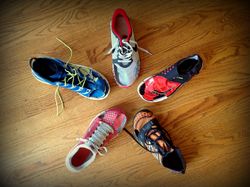
With a few exceptions such as the Mizuno Curoris, I find that most shoes benefit from cutting open the toe box. This allows the toes to spread out as you toe off, creating more natural biomechanics and preventing toe blisters.
8 Shoes for Heavier Runners
As a broad generalization, foot length is generally proportional to height, body weight is proportional to the square of your height, and foot area is proportional to the square of your foot length. This means that for a given BMI, the perceived cushioning should be about the same regardless of absolute weight, and you'll need more cushioning if your BMI is higher, and less cushioning if your BMI is lower. You may also need more cushioning if your feet are disproportionately small and less if your feet are disproportionately large. Of course, different runners prefer radically different levels of cushioning, with some liking an un-cushioned minimalist shoe and others a massively cushioned Maximalist shoe. But if you'd like to scale my reviews, I'm 5' 10"/180cm, I weigh about 140 pounds/64 Kg, which is a BMI of about 20, and take about a men's US 10.5/UK 10/EU 45 shoe size.
9 Shoe Gallery
Images of the shoes reviewed on this site can be found in the Shoe Gallery.
10 Shoe Dissection
Main article: Shoe Dissection
Ever wonder what the inside of your shoe looks like? Take a look inside; I've cut many of my shoes in half to reveal their construction, as you can see above. You can see a gallery at Shoe Dissection, as well as in the detailed shoe reviews.
11 Frankenshoes
Main article: Frankenshoes
